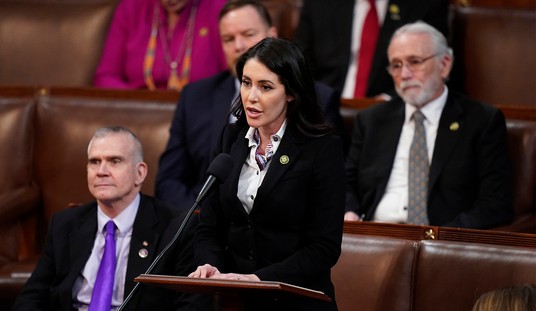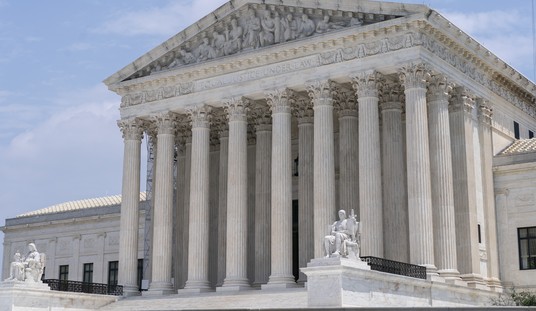Here’s a bit of press-critiquing weekend reading for you. I know it’s generally unwise to rely on The Economist for coverage of American domestic policy, simply because it’s not their focus. But I am far less likely to do so after reading this error-filled piece on the Florida court decision, unsigned (as all Economist pieces are) and published three weeks ago, which prompted the letter below from myself and an attorney friend. It also inspired Dan McLaughlin to send along this link to a quote from Michael Crichton about the foolishness of trusting mass media. It applies to a number of situations:
Briefly stated, the Gell-Mann Amnesia effect is as follows. You open the newspaper to an article on some subject you know well. In Murray’s case, physics. In mine, show business. You read the article and see the journalist has absolutely no understanding of either the facts or the issues. Often, the article is so wrong it actually presents the story backward-reversing cause and effect. I call these the “wet streets cause rain” stories. Paper’s full of them.
In any case, you read with exasperation or amusement the multiple errors in a story, and then turn the page to national or international affairs, and read as if the rest of the newspaper was somehow more accurate about Palestine than the baloney you just read. You turn the page, and forget what you know.
In the two issues since we sent it, The Economist has declined to print even an excerpt of our letter, and has retracted none of the errors we cited. Nonetheless, we hope you will find our critique entertaining.
—
Dear Sir,
Your article in the Feb. 3rd print edition concerning the health care ruling in Florida—“Health Care: Dead or Alive?”—was a disappointing read rife with error. Several statements are blatantly false based on the text of the law, and others are very debatable conjectures. The sheer number of factual inaccuracies is daunting, many of which could easily have been avoided had the author asked any legal expert or policy scholar a few questions prior to its publication.
The author writes: “the states’ main responsibilities under the law—to set up exchanges where residents can buy insurance … do not begin until 2014.” This date is wrong. The Kaiser Health News implementation timeline and the text of the law itself notes that states must set up exchanges by January 1, 2013 to be audited by the Dept. of Health and Human Services (HHS).
The author writes: “The law bars states from tightening their eligibility requirements for Medicaid.” This sentence is simply false. President Obama’s law itself, as HHS Sec. Kathleen Sebelius wrote to all fifty governors recently, specifically allows for states facing budget deficits to reduce Medicaid eligibility. No law bars them from doing so, and the only penalty for such a decision is a loss in some federal matching funds (unless a waiver is granted). This error is particularly mind-boggling because if what the author said was true, Sec. Sebelius would have been explicitly urging the governors of all fifty states to break the law.
The author writes, in the same paragraph: “One, Arizona, has already asked the HHS for a special waiver to drop coverage for 280,000 people. Should it and other such states decide that the health-care law no longer has any force, they could start to jettison Medicaid patients without permission.” These two sentences make a bizarrely inaccurate policy connection. According to the New York Times, Arizona is seeking to remove eligibility which was expanded not by President Obama’s law but by a 2000 state referendum (indeed, the Medicaid eligibility expansion under President Obama’s law does not begin until 2014). Despite what the author writes, the Arizona request and the decisions of other states to “jettison” or limit eligibility requirements can be conducted regardless of their opinion of whether the “law no longer has any force.” Gov. Andrew Cuomo of New York has discussed such restrictions, and Gov. Jerry Brown of California—himself a supporter of the law—has proposed cutbacks in Medicaid to the tune of $1.7 billion, along with several other Democrat governors.
The author writes: “The ruling marks the federal courts’ fourth tilt at the health-care law” and goes on to equate the rulings involved. The number given is false, and the comparison is inaccurate at best, given that the two major cases where states filed lawsuits against the law—Virginia by itself, and Florida along with 25 other states, the National Federation of Independent Businesses, and two individuals who claim they will be directly affected by the law—while the two cases the author refers to were brought by a Christian university and a conservative legal center. As such, both were primarily dismissed over standing issues—that is, whether the plaintiffs had been harmed yet by the law, having valid cause to bring the cases and the right to raise these issues in court at all—with the constitutionality of the law itself a decidedly secondary issue. On the other hand, if the comparison here is considered valid by the editors, than the overall number given is factually incorrect. If the author is intentionally including cases with less significant plaintiffs than the states themselves in suggesting equivalency or irrelevance, the total must necessarily include federal lawsuits brought by an Arizona Tea Party group, a Tennessee Tea Party organizer, a former California assemblyman, an Arkansas grassroots group, a leading “birther” in California, and more—a dozen cases in all were dismissed over the course of last year for primarily jurisdictional reasons.
The author writes: “Moreover [Judge Vinson] said that his ruling should have immediate effect, thereby relieving the 26 states that had joined the lawsuit of their obligation to implement the law.” This implies more than what happened. In fact, Judge Vinson entered summary judgment, which on a declaratory judgment action (which this was) means that he automatically invalidated the statute. Judge Vinson explicitly said that he expected the federal government to obey the law as he had construed it, while explicitly refusing to grant an injunction. The difference is subtle, but important: The court basically states that it expects all of the parties to treat his ruling as the law — as it is, in the American system — without compelling them to do so.
The author writes: “The government could try to rein in wayward states by seeking a stay on the ruling while an appeal is heard. Few observers imagine the relevant appeals court, in Atlanta, would withhold one.” This is an open question, and the author clearly goes too far in his blanket assumptions. It seems very likely that the Eleventh Circuit will expedite briefing and ruling, making it far less likely they’ll actually enter a stay.
The author writes: “Whatever the outcome, the case, along with the many other legal challenges to Obamacare, seems certain to wind up in the Supreme Court. But that will take at least a year, perhaps more.” While this would be true if this was an ordinary appeal, this is not an ordinary appeal. Given the timelines involved and the importance everyone attaches to this bill, as well as the lack of a delay because of investigatory requirements, most practitioners expect the Eleventh Circuit to expedite the intermediate appellate process, including briefing and ruling. The appeal to the Eleventh, including the inevitable en banc ruling, should be done inside of three or four months, if not less. And already in Virginia, Attorney General Ken Cuccinelli has requested expedited consideration. The timeframe suggests that the author should consider the under, not the over.
The author writes: “[Judge Vinson] made colourful references to libertarian websites, broccoli and the government’s takeover of GM.” The broccoli and General Motors arguments—along with the note about the concession on marriage and child-rearing being economic activity at oral argument—are normal attempts to reason by analogy, something courts typically do all the time, and things on which the government conceded the points (Opinion at 47). The libertarian website mentioned was merely his way of providing a citation to the opinion of Dean Erwin Chemerinsky of the University of California at Irvine School of Law, a noted supporter of the law who made exactly the same points. What’s more, in a Senate hearing mere days after the Vinson decision on the constitutionality of the individual mandate, Democrat Sen. Dick Durbin of Illinois posed the same broccoli question to respected Harvard Law scholar Charles Fried, who said in his testimony that forcing someone to purchase broccoli “may not be a good idea, but I don’t see why it’s unconstitutional.” Treating these questions as irrelevances when they were actual parts of the argument before the court is the argument of a dullard who has clearly never read a legal opinion before.
The author writes, in the following sentence: “There was lots of discussion of the intentions of the Founding Fathers, and relatively little reliance on boring old legal precedent.” The second portion of this sentence is patently false. Judge Vinson spent an enormous amount of his decision on precedent, including a full 18 pages on a discussion of the Commerce Clause generally and relevant historical precedent, before beginning his analysis (also filled with citations to precedent) of the impact of that Commerce Clause precedent on this law. Did Vinson limit his focus to case law? No, admittedly not. He also discussed words in their original context, using the obscure works of some fellow who had the gall to write the first dictionary. He also relied on that rarely-cited-in-judicial opinions, marginal work The Federalist Papers.
The author writes: “One of the precedents Mr. Vinson did dwell on, from 1935, has since been widely discredited, Mr. Pasquale points out. In general, he argues, even the more conservative members of the Supreme Court have taken a more generous view of the federal government’s power to regulate commerce in recent years.” This is a misdirection, one which we should perhaps credit to Mr. Pasquale and not to the author. The majority of Vinson’s ruling is based on recent Supreme Court precedent; indeed, he spends time dwelling on the conflict of the Lopez line of cases on the one hand and Raich and a 1942 case, Wickard, on the other, before concluding that the former, a 1995 case and its successors, controls the outcome. Did he cite older opinions? Of course—but only, in that eighteen-page discussion of the growth and change of Commerce Clause jurisprudence, after taking the time to note that the New Deal-era opinions had largely expanded the Commerce Clause jurisprudence well past that “discredited” 1935 case. [Note: We assume that the author does not intend to refer to U.S. v. A.LA. Schechter Poultry Corp., a case that Judge Vinson uses in passing to make the obvious-to-every-law-student point that at some level, every activity touches interstate commerce (Opinion at 53), which he follows up with a Supreme Court citation noting that it is still a concern in Commerce Clause jurisprudence.] Citing such matters in the historical discussion was perhaps “dwelling on it,” but it was not “basing on it.” Considering that the case of the survival of the healthcare reform act will rise and fall on whether the individual mandate is an exercise of Congress’s power to regulate commerce – that is, whether it can declare a class of inactivity as having a substantial impact on interstate commerce, and forbid it on penalty of fines—and on whether the mandate can be severed from the law as a whole, criticism of thoroughness and fidelity to the current state of the law on that portion of the matter strikes us as ridiculous sophistry at best.
We request at least consideration of a retraction or correction for the above items, but more importantly, that in the future you consider assigning an individual to write on this key American domestic policy debate with more attention to the facts. In an article of less than 1,000 words, it is rare to see so many incomprehensible inaccuracies abound. This is itself an achievement of a sort—but it is one we hope will not be repeated.
Very Respectfully,
Benjamin Domenech
Research Fellow, The Heartland Institute
Leesburg, Virginia
Christopher Badeaux, Esq.
Attorney at Law
Atlanta, Georgia














Join the conversation as a VIP Member